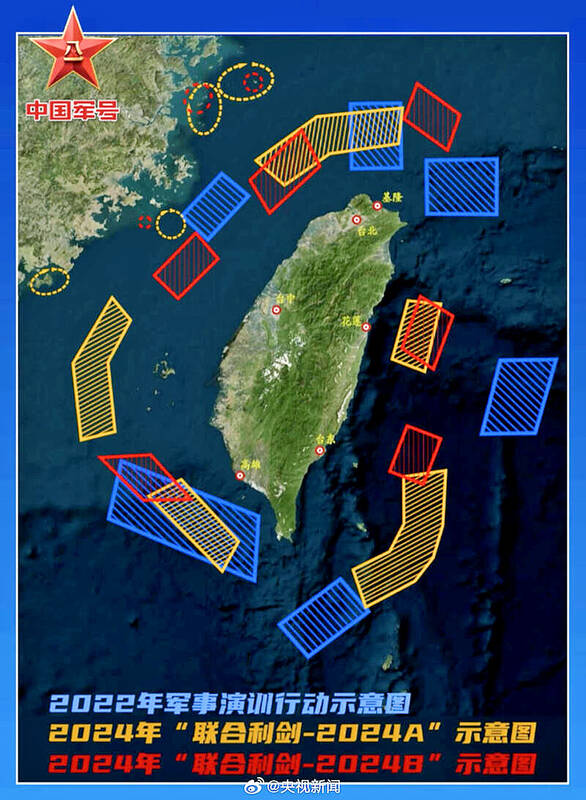Although China’s “Joint Sword-2024B” military exercises around Taiwan on Monday were apparently shorter than the previous “Joint Sword-2024A” drills, they were intense in terms of swift simulated attacks and deployment of ships and aircraft.
The previous large-scale military drills encircled Taiwan on May 23 and 24, the purpose of which was to respond to President William Lai’s (賴清德) May 20 inaugural address.
Lasting only 13 hours, Monday’s exercises came four days after Lai delivered his first Double Ten National Day address, in which he said the People’s Republic of China has “no right to represent Taiwan” and reiterated that the two sides of the Taiwan Strait were “not subordinate” to each other.

Photo: Screen grab from the Chinese People’s Liberation Army Eastern Theater Command’s Sina Weibo account
The Chinese People’s Liberation Army (PLA) said that part of the drills practiced what it called a “key port blockade”, severing Taiwan’s maritime lifeline for imports of trade, food and energy.
It aimed to show China’s ability to stop energy imports, especially at ports offloading liquefied natural gas (LNG), PLA National Defense University professor Zhang Chi (張弛) told China’s Global Times.
“The People’s Liberation Army wants to prove that we have the ability to block the import of energy resources for Taiwan, thereby having an important impact on the economy and society,” the newspaper quoted Zhang as saying.

Photo: Ritchie B. Tongo, EPA-EFE
Foreign military attaches and analysts said this element of the drills is being closely scrutinized, as such a tactic could pressure and isolate Taiwan ahead of any full-blown invasion.
State-run energy company CPC Corp, Taiwan said LNG imports had been unaffected by the drills, decrying as false news online suggestions to the contrary.
“This time there was a rather special component, the so-called quarantine or blockade, during which they practiced their blockading abilities,” said Su Tzu-yun (蘇紫雲), director of defense strategy and resources at the government-funded Institute for National Defense and Security Research.
The drill zones portrayed in a map issued by the PLA were closer to Taiwan than in previous exercises, with all, for the first time, including areas within Taiwan’s 24 nautical mile (44.4km) contiguous zone.
“All the drill zones they announced are more closely approaching Taiwan proper, and all include the 24 nautical mile zone,” said Ma Chen-kun (馬振坤), director of the Graduate Institute of China Military Affairs Studies at National Defense University.
The China Coast Guard, now the world’s largest by far, was more heavily involved in the drills than earlier, encircling the Taiwan-controlled Matsu islands near the Chinese coast and operating on both sides of Taiwan proper.
Taiwan is particularly wary of China Coast Guard efforts to board civilian ships on law enforcement grounds.
Such instances could be a serious provocation that the Coast Guard Administration (CGA) would do everything to prevent, CGA Deputy Director-General Hsieh Ching-Chin (謝慶欽) said on Monday.
Previous Chinese war games have been accompanied by the release of military videos of animations of missile attacks on Taiwan.
This time, one caricatured Lai with devil-like pointed ears, in what one security source in Taiwan called an unusually personal attack on a man Beijing already detests as a “separatist.”
China also released two less slickly made videos of navy sailors commenting on weather conditions and their locations, close to the ports of Keelung and Kaohsiung.
In Taiwan, television stations show such videos as part of regular drill coverage. The government calls them part of “cognitive warfare” waged to sap confidence in its military.
Shortly after Monday’s drills began, the CGA said it detained a Chinese citizen using a rubber boat to approach Menghu Islet (猛虎嶼) near Kinmen County and opposite Xiamen, China.
The CGA said it could not rule out the incident as one of China’s “gray zone” activities threatening outlying islands during the drills.
Additional reporting by staff writer

Several Chinese Nationalist Party (KMT) officials including Chairman Eric Chu (朱立倫) are to be summoned for questioning and then transferred to prosecutors for holding an illegal assembly in Taipei last night, the Taipei Police said today. Chu and two others hosted an illegal assembly and are to be requested to explain their actions, the Taipei City Police Department's Zhongzheng (中正) First Precinct said, referring to a protest held after Huang Lu Chin-ju (黃呂錦茹), KMT Taipei's chapter director, and several other KMT staffers were questioned for alleged signature forgery in recall petitions against Democratic Progressive Party (DPP) legislators. Taipei prosecutors had filed

Taiwan would welcome the return of Honduras as a diplomatic ally if its next president decides to make such a move, Minister of Foreign Affairs Lin Chia-lung (林佳龍) said yesterday. “Of course, we would welcome Honduras if they want to restore diplomatic ties with Taiwan after their elections,” Lin said at a meeting of the legislature’s Foreign Affairs and National Defense Committee, when asked to comment on statements made by two of the three Honduran presidential candidates during the presidential campaign in the Central American country. Taiwan is paying close attention to the region as a whole in the wake of a

President William Lai (賴清德) has appointed former vice president Chen Chien-jen (陳建仁) to attend the late Pope Francis’ funeral at the Vatican City on Saturday on his behalf, the Ministry of Foreign Affairs said today. The Holy See announced Francis’ funeral would take place on Saturday at 10am in St Peter’s Square. The ministry expressed condolences over Francis’ passing and said that Chen would represent Taiwan at the funeral and offer condolences in person. Taiwan and the Vatican have a long-standing and close diplomatic relationship, the ministry said. Both sides agreed to have Chen represent Taiwan at the funeral, given his Catholic identity and

NEW WORLD: Taiwan is pursuing innovative approaches to international relations through economics, trade and values-based diplomacy, the foreign minister said Taiwan would implement a “three-chain strategy” that promotes democratic values in response to US tariffs, Minister of Foreign Affairs Lin Chia-lung (林佳龍) said. Taiwan would aim to create a “global democratic value chain,” seek to capitalize on its position within the first island chain and promote a “non-red supply chain,” Lin was quoted as saying in the ministry’s written report to the Legislative Yuan submitted ahead of the legislature’s Foreign Affairs and National Defense Committee meeting slated for today. The Ministry would also uphold a spirit of mutual beneficial collaboration, maintaining close communication and consultations with Washington to show that Taiwan-US cooperation